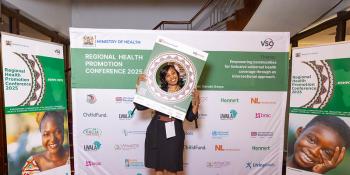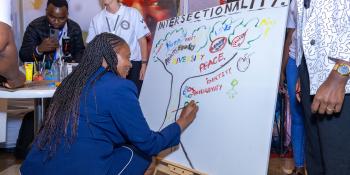After nearly three decades working as a teacher, Portuguese volunteer Ana Paula Pinto shares her experiences volunteering in Myanmar. Educating children here has not always been a priority but Ana Paula says that’s changing, slowly but surely.
Tough work for long hours in the fields is how most of the population of Mon state in southern Myanmar make a living. Some cross the border to Thailand in the hope of a better future, though unscrupulous employers and dangerous work can make many regret their choice.
In both cases, low incomes mean the education of children is rarely a priority; often they’re forced to toil in the fields themselves. If their parents are in Thailand, they may well be looked after by elderly relations who have little time or money to spare for education.
As a result, schooling is rarely affordable in rural areas, with limited facilities and poorly trained teachers adding to the problem.
The solution? Ana Paula Pinto, 55, is on a mission to get parents and students passionate about education, and to train teachers to improve their knowledge and skills.
“I trained teachers on how to run clubs and extracurricular activities and explained how this might encourage students to stay in school.”
By letting students choose extracurricular activities they want to partake in, such as a football club or a library club, students have become more motivated.
“As children start to enjoy school, they can push their mother, father and the wider community to support their education,” says Ana Paula.
She’s already played a key part in a one-year project aiming to improve student participation among children aged 10-13, working with 3,000 parents and over 200 teachers. Now, she’s volunteering in a teaching college supporting teacher's development and supporting the British consul to improve teacher's English language ability.
“Everyone wants to give their children the best education. This alone can help to overcome differences. Even if there are small disagreements, you are all united behind the same goal.”
A catalyst for change
Early on, Ana Paula started to see changes.
“Even after just two or three meetings with the teachers, I started to see them become more open with me and share more.”
Ana Paula also collaborated with a Burmese volunteer to run community outreach sessions discussing the importance of education.
“Little by little people started to understand that it's better for children to stay in school. They began to realise that education is a chance to improve their family.”
It’s not just parents and teachers who are benefiting. Ana Paula started to see youth volunteers become more confident. These volunteers help spread the message that children should go to school, while also developing their public speaking skills.
One youth volunteer, Phyu Pyar Oo, was born with a speech disorder. Phyu Pyar joined the education project in Myanmar last year.
“I was always afraid people would judge me because of my disability. I’d never go out in public because of this, and I started to become disconnected from people.
“When I found out about this VSO project, I was scared to join at first. Through the training, though, I found the confidence to go out in public. Volunteering with VSO changed my life and I am so proud to be a VSO volunteer.”
"It's about people, not money"
Ana Paula first volunteered with VSO 20 years ago in Guinea-Bissau, and then Mozambique, after seeing a newspaper advert: “I chose to volunteer with VSO because they put people first. When it comes to volunteering, it’s not money that’s important. It’s all about building relationships.”
Ana Paula returned to focus on her teaching career in Portugal but couldn’t stay away from volunteering for long.
“I understand the teachers here – we fight the same battles. In both Myanmar and Portugal, there are similar problems, like a lack of resources and too much bureaucracy and too many reports.
“However, the relationship between teachers and students is more respectful in Myanmar; in Portugal we have more behavioural problems.”
“It's rewarding to be able to share my teaching experience, but it’s also rewarding to receive knowledge and then talk with my students in Portugal, explain to them how things are similar and different in Myanmar.”
A great adventure
Ana Paula also has some words of advice for those considering volunteering.
“If you are thinking of volunteering with VSO, don't bring the way you work in your home country to this new place. Instead, be open to new ideas, be patient and listen.
“I learned so much as a volunteer that when I returned to Portugal I realised my behaviour and the way I teach had changed a little. I was more able to bring new ideas to the classroom.”
“VSO gave me an opportunity to share my skills, to learn and to grow as a person. It's rewarding to be able to share my teaching experience.”
Ana Paula Pinto, education volunteerI think of volunteering as an adventure: there are good parts and bad parts, but the positive always outweighs the negative.
We're urgently recruiting teachers and other education professionals in a range of countries from Myanmar to Mozambique.
Read more

The two volunteers empowering girls and young women in Mozambique
Nelma and Carmirene and are two volunteers working on VSO's EAGLE project in Mozambique. For Nelma and Carmirene, education is not just about school, it is about meeting people where they are and using the right tools to challenging harmful norms. Here are their stories.

In photos: Our Regional Health Promotion Conference 2025
Check out some of our favourite photos from Regional Health Promotion Conference (RHPC25). This event sought to reimagine Universal Health Coverage through the lens of intersectionality.

Using intersectionality to create healthy beginnings and hopeful futures
World Health Day brings global attention to the urgent need to end preventable maternal and newborn deaths. Learn more about how our Regional Health Promotion Conference is tackling these issues head on.
